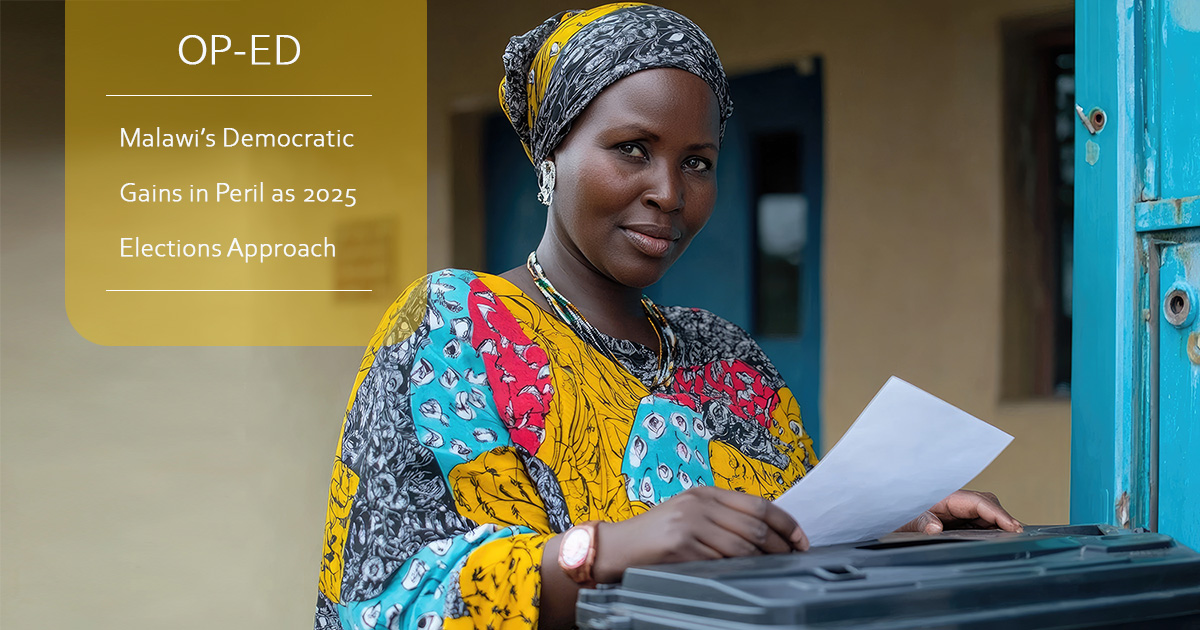As Malawians prepare to head to the polls on September 16, 2025, the country finds itself at a dangerous crossroads. A phenomenon distinct from previous elections in the country's democratic history. The silence from regional bodies, such as the Southern African Development Community (SADC) and the African Union (AU), is deafening. Once praised for its relative stability in a region often plagued by contested elections, Malawi is now grappling with intensifying violence, growing political distrust, and deepening public skepticism over its electoral institutions. The echoes of the annulled 2019 elections still ring loud and this time, the stakes are even higher.
In 2019, Malawi's judiciary made international headlines for its unprecedented decision to nullify presidential election results due to widespread irregularities. The ruling was lauded as a triumph for judicial independence and democratic accountability, giving hope that Malawi was turning a corner toward a more credible and transparent electoral future. It spurred key legal reforms, including the passage of the Presidential, Parliamentary, and Local Government Elections Act No. 10 of 2023 and the re-demarcation of electoral boundaries. And yet, today, Malawi teeters on the brink of electoral regression.
Multiple reports of politically motivated attacks, the brutal beating of protestors in Lilongwe, and the disruption of opposition gatherings in rural constituencies suggest a worsening climate of intolerance. The muted response by law enforcement and political authorities to such violence only fuels suspicions of state complicity or, at the very least, institutional indifference. At the centre of the storm lies the Malawi Electoral Commission (MEC), whose credibility has been challenged by opposition parties and civil society actors alike. Though the MEC has been commended for technical readiness, concerns over the political affiliations of its top leadership have cast a long shadow over its perceived independence. In an already volatile atmosphere, perception is everything and many Malawians are watching warily.
Voter registration, too, has revealed troubling gaps. Of the estimated 10.9 million eligible voters, only 7.2 million were registered. Women make up the majority of the electorate, but the low overall turnout speaks to a crisis of confidence. While the MEC cites progress, others point to insufficient voter education, deliberate under-registration in opposition-supporting areas, and the under-resourcing of civil society organizations as the primary concerns. If a third of the electorate is disengaged before ballots are even printed, it is cause for alarm. And then there’s the perennial problem of campaign finance. Malawi’s Political Parties Act of 2018 may look impressive on paper, but in practice, it has failed to level the playing field. Transparency in party financing remains elusive. The ruling party is accused of exploiting its incumbency to access state resources, while opposition parties lament unequal distribution of public funds. Without firm enforcement mechanisms, Malawi’s political financing system risks becoming a backdoor for unchecked influence.
Malawi’s democratic story need not end in disappointment. The reforms initiated after 2019 proved that renewal is possible, even after electoral rupture. But for that momentum to continue, democracy supporting institutions such as the judiciary, the Malawi Police, and the Army must uphold integrity, political leaders must denounce violence in all forms, and the state must allow civic voices especially those pushing for electoral justice to be heard, not silenced. Malawi stands at a defining moment. To falter now would not only betray the promise of the 2019 judicial landmark, it also dim the democratic beacon that so many in the region once looked to with hope. This paper therefore calls for international stakeholders SADC and the AU, the African Centre for Governance (ACG), and the European Union (EU) to immediately and closely monitor Malawi’s election process, and offer technical support now before the whole election process goes into disarray. Once supported, Malawian elections would once again show that Democracy can prevail in Africa.
In conclusion, Malawi’s electoral landscape in 2025 presents a stark paradox on one hand, the memory of judicial courage and reform following the 2019 annulled elections; on the other, a deepening crisis of confidence that threatens to reverse those very gains. The warning signs of voter apathy, political violence, contested electoral authority, and unequal campaign conditions are not isolated events but symptoms of a democratic system under strain. Without urgent and coordinated responses from domestic institutions and regional actors like the SADC, the AU, the ACG, and the EU, Malawi risks descending into a cycle of contested legitimacy and democratic decay. Yet, the window for course correction remains open. With sustained support, vigilant observation, and a recommitment to electoral fairness, Malawi can reaffirm its place as a regional exemplar of democratic resilience. The time to act is not post-election but now, while the promise of credible, peaceful, and participatory elections can still be upheld.
Tendai Mbanje is a Governance Expert focused on electoral integrity, inclusive policymaking, and democratic resilience across Africa. He writes in his personal capacity.


